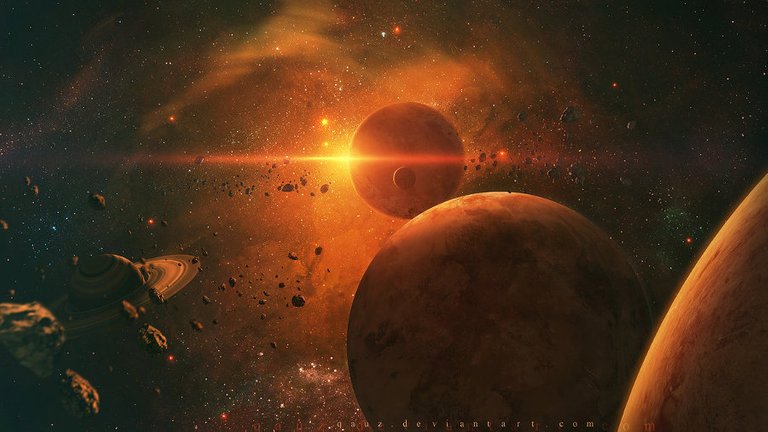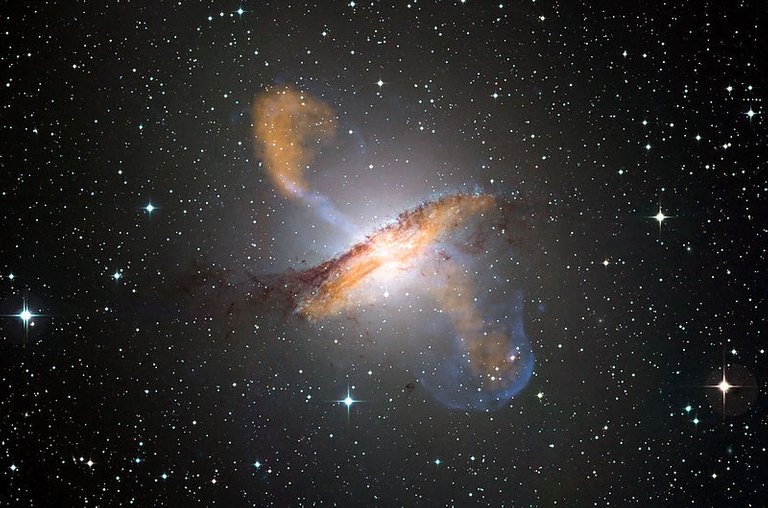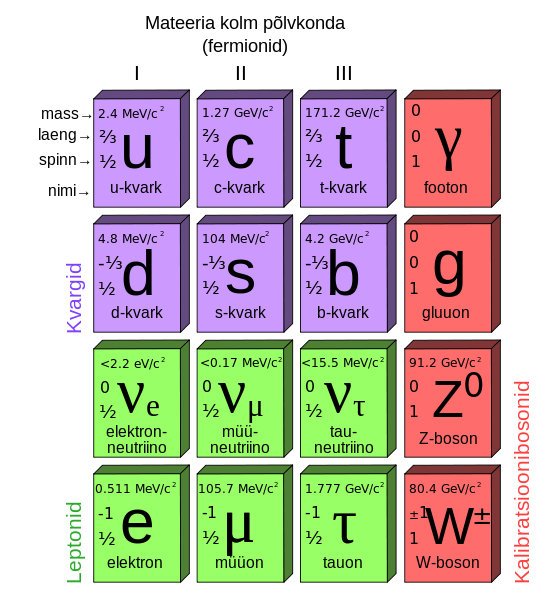First Cause?
Science, in its quest to shed light on the true nature of reality, has for hundreds of years held the belief that the principle of causality is at the foundation of all there is. This short post is about places where causes seize to exist or lose significance...

Eternity - Image by QAuZ - source: Deviantart
And this should not surprise anyone; everything that happens has a cause. And causes precede effects in time; first I push you, then you fall in the water. This everyday experience we have with causes and effects has ingrained in us a deep belief that everything in life and the universe obeys the fundamental law that nothing happens without a cause. If you want to move something, you have to make it move; you kick a ball to make a goal.
Here on earth, where there's friction, the ball will stop moving eventually, score or not. In friction-less space however, the ball would just keep moving and wouldn't slow down. If something has no end, does it need to have a beginning still? Doesn't the law of conservation of momentum make it possible to believe that stuff just moves in the universe? That a state of movement is the natural state? That stuff simply moves until something causes it to stop?
In this friction-less world we could predict with great certainty and precision the location, speed and direction using Newtons laws. The equations used to do these predictions work in both ways, from the current location, speed and direction you can also calculate where everything was in the past. It's what the whole Big Bang Theory is based on: we observe that the universe is expanding with everything moving ever further away from everything else, and can therefore reason that in the past everything must have been awfully close to each other up until the point that everything's contained in an infinitely small region of... well maybe not space but nothing? We can even calculate how long it's been since then, approximately 13.8 billion years, but at that point knowledge stops.
In everyday parlance we speak of the "Big Bang" as the beginning of the universe. It's a little known fact that the Catholic Church was actually rather pleased with science catching up on their belief that the universe indeed had a beginning, as they could now claim that science supports their belief in an almighty creator, God as the primary cause. The argument, which dates back to medieval Islamic science, is called the "Kalam cosmological argument" and goes something like this: 1) Everything that begins to exist has a cause, 2) the universe began to exist, 3) therefore, the universe has a cause. Christians will then append: "therefore God."
But there are several problems with this cause-and-effect origin story about the universe. Causes precede effects, therefore causality is a temporal phenomenon. The problem is that time only began to exist when the universe began to exist; our human minds simply aren't equipped to imagine timelessness, and logically speaking there's no moment in time before time began to exist; this is the first place where speaking about a cause breaks down. Sure, we can fudge this, and we often do, by speaking about causes in "the very first moment in time," but that doesn't explain that very first moment itself. Religious believers say that therefore an almighty being existing outside of spacetime must have ushered the universe into being. The question then becomes: what was this almighty being doing before he or she or it spoke the words that materialized spacetime? At some moment they began speaking the words, no? However you want to attack this conundrum, there's no escaping the logical pitfalls attached to infinite regress; infinity is another weak point for the human mind.

Best-Ever Snapshot of a Black Hole's Jets - source: Wikimedia Commons
Our world is ruled by cause and effect: it's what we all know and feel comfortable with. But... Imagine a super intelligence, a supercomputer that knows the current position, speed and direction of every particle in the universe, that super-intelligence would know everything about everything both in the past, present and future. This super-intelligence would see a four-dimensional spacetime universe in which past, presence and future are not linked by causes and effects, but by certain patterns called the laws of nature, or the universal laws of physics.
Just like numbers, on a line of integers the 1 follows after 0 which follows after -1, we don't say that -1 causes 0 which causes 1. They just form a pattern in which one happens after the other and we know the entire pattern given a starting-point and some rule to reach the next element in the pattern. This is a fundamentally different way to look at the world and one that's counter-intuitive for most of us. But it is the world of quantum field theory. And this is where things get even weirder... Quantum field theory (QFT) is the most fundamental physics theory we have and is accepted among most particle physicists and cosmologists, and it says that the reality that's out there is completely different than what we are able to observe:
QFT treats particles as excited states of an underlying field, so these are called field quanta. In quantum field theory, quantum mechanical interactions among particles are described by interaction terms among the corresponding underlying quantum fields.

source: Wikimedia Commons
Simply speaking, this means that for every fundamental particle there exists in the universe a field; there's an electron-field, a photon-field, a neutron-field and so on. And what we observe is just these fields in so called excited states. There's also one somewhat special field: the Higgs field. The Higgs field provides mass to all other particles by interacting with their respective fields and not interacting with particles that don't have mass. In the equations of these quantum fields there's no notion of causes or effects. Time is present in the equations but it has no particular direction and space is not present in the equations, which would make space an emergent property of the more fundamental elements. However counter-intuitive this all might seem, Quantum mechanics is the most successful theory we have in terms of making predictions (I mean, the Higgs Bozon was predicted long before it was shown to exist, as were many other elemental particles) and making ultra precise calculations in the "real world". Quantum mechanics, as it turns out, is another place where causes lose much significance.
Okay, I'll leave it there and hope I haven't caused you a headache. I'm just an inquisitive mind without credentials in the fields discussed here, and a lot of this post is based on the work of Sean Carroll. For those of you for who are interested to hear a lot more about QFT and its implications for our understanding of reality I'll link below his Google Talk called "The Big Picture". I'll be back here tomorrow, as I am now and as I was yesterday; following this pattern it's evident that you'll be back here with me, dear reader, you know, cause and effect ;-)
The Big Picture | Sean Carroll | Talks at Google
Thanks so much for visiting my blog and reading my posts dear reader, I appreciate that a lot :-) If you like my content, please consider leaving a comment, upvote or resteem. I'll be back here tomorrow and sincerely hope you'll join me. Until then, stay safe, stay healthy!

Recent articles you might be interested in:
| Latest article >>>>>>>>>>> | Baby Musk Coin |
|---|---|
| Invest In Humanity | Recycle Scam |
| Poor White Racist | Flat-Earth Fallacy |
| Carbon Footprint | Believe Me (repost) |

Thanks for stopping by and reading. If you really liked this content, if you disagree (or if you do agree), please leave a comment. Of course, upvotes, follows, resteems are all greatly appreciated, but nothing brings me and you more growth than sharing our ideas.
The arguments of the ancient philosophers generally conclude that the Mind of God must be something greater than the mind of man and that mankind cannot conceive of this Mind of God.
Could God conceive the mind of man?
The Trinity view claim is that God somehow took on human form as Jesus Christ and that personage of God experienced the suffering that mankind experiences.
It is a logically consistent argument.
Hi @irivers, You Have No Enough WINEX Tokens To Make A Successful Call.
Please Stake at least 25.000 WINEX Tokens.
(We Will Not Send This Error Message In Next 24 Hrs).
Contact Us : WINEX Token Discord Channel
WINEX Current Market Price : 0.300
Swap Your Hive <=> Swap.Hive With Industry Lowest Fee (0.1%) : Click This Link
Read Latest Updates Or Contact Us
All this talk about the universe, what about thoughts, the inner verse,
Even quantum theory simply avoids dealing with the inner verse, with awareness, which breaks quantum physics, they can't explain awareness in any degree.
Dear my friend @zyx066, Do you mean that in the beginning superintelligence existed and created the universe?
Then, why did the superintelligence create the oceans and countless living things only on Earth in the universe?
Why is mankind born and prosperous only on Earth in the infinite universe?
Astronomers often commit suicide out of despair that life exists only on Earth in an infinite universe.
I think that the fact that countless living things were born and prospered only on Earth in the infinite universe proves the existence of God!
If, as you claim, superintelligence created the universe, there would be humanoid lifeforms and civilizations on other planets!